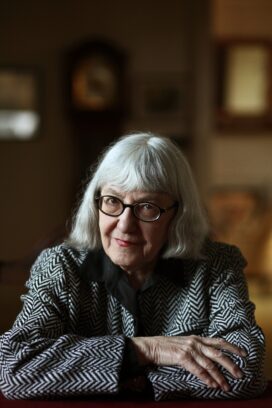Books
Fiction
Cynthia Ozick’s Latest Does Not Disappoint

Temple Academy for Boys hasn’t had a student in more than 30 years when Cynthia Ozick’s new novella opens on the school’s leafy Westchester, N.Y., campus in 1949. Its buildings had been converted to living space for use in perpetuity by the school’s 27 trustees, all aging former students, most of them now deceased.
Lloyd Wilkinson Petrie, the youngest of the remaining seven trustees, is a widower, a lawyer retired from the firm founded by his great-grandfather and distanced from his son. He considers himself “a person of lineage.” The school’s name might be misleading. It is not part of any Jewish institution but rather named for the patrician Temple family that donated the land and, indeed, only a small number of Jews ever walked the academy’s hallways.
In Antiquities, Ozick explores themes and questions that have engaged her throughout her distinguished writing life, including history, memory and language. Ozick’s many fans won’t be surprised to read that author Henry James is related to the Temple family; a large portrait of him that used to hang in the school’s chapel is now in the academy’s vault. She also slips in references to Alfred Dreyfus, Martin Buber and the biblical burning bush.

So as not to take away the pleasures of reading this novella, I won’t reveal much.
Antiquities is narrated by Petrie, who describes his youth at the academy interspersed with meditations on his present life.
In fact, each of the remaining elderly trustees has agreed to write a short memoir to record the academy’s history, to be stored in a vault with other mementos. In its heyday, the academy emphasized French and Latin, football and horsemanship. (Neither sport appealed to Petrie, who managed to sidestep them and stay in his cell-like room, playing chess with pretend opponents.)
Tapping on his Remington typewriter in the late nights, Petrie seems to be the only man at work. He digresses to describe the other trustees and the weather as well as his own need to nap. Often, he thinks of quitting the project, whose pages he keeps in a still-fragrant cigar box that once belonged to his late father. Petrie also keeps a collection of curious amulets, figurines and other relics that his father collected in an uncommon 1866 solo trip to Egypt.
At the heart of Petrie’s memoir is his recollection of, even obsession with, mysterious former classmate Ben-Zion Elefantin. Elefantin, who was shunned by the other students, spoke with an unidentifiable accent, tucked red curls behind his ears and ate only hard-boiled eggs, bread and milk in the school’s refectory. Petrie writes in his memoirs how, when they were schoolboys, Elefantin confided his family’s story to him in private, claiming it was rooted in Egypt, on an island in the Nile—but they were cast out of Jewish history.
Another unforgettable character is Hedda, a European refugee who serves as cook and caregiver to the trustees. Since the closure of the academy, its book collection is largely unwanted and untouched. Hedda, the last employee remaining from the academy’s golden years, enjoys the works of poetry and others from the collection and takes and stacks books in the kitchen pantry.
Readers will enjoy Ozick’s playfulness and wit in imagining these characters as well as her ever-firm commitment to truth-telling.
READ MORE: A Q&A With Cynthia Ozick










 Facebook
Facebook Instagram
Instagram Twitter
Twitter
Leave a Reply